【新课标】Unit 1 What's the matter SectionA(Grammar Focus-4c)课件(共43张PPT)
文档属性
| 名称 | 【新课标】Unit 1 What's the matter SectionA(Grammar Focus-4c)课件(共43张PPT) | 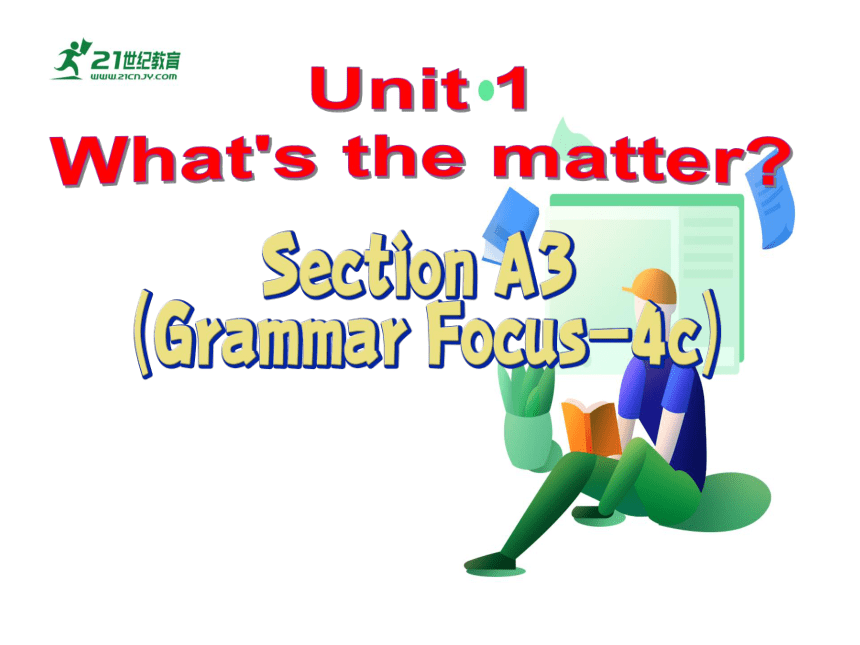 | |
| 格式 | pptx | ||
| 文件大小 | 2.2MB | ||
| 资源类型 | 试卷 | ||
| 版本资源 | 人教新目标(Go for it)版 | ||
| 科目 | 英语 | ||
| 更新时间 | 2023-02-09 11:33:10 | ||
图片预览


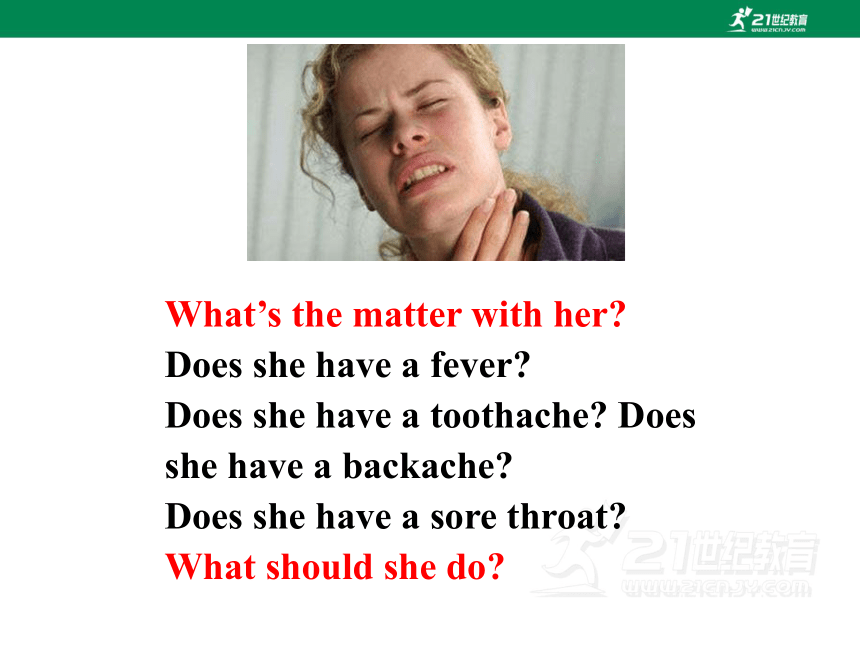
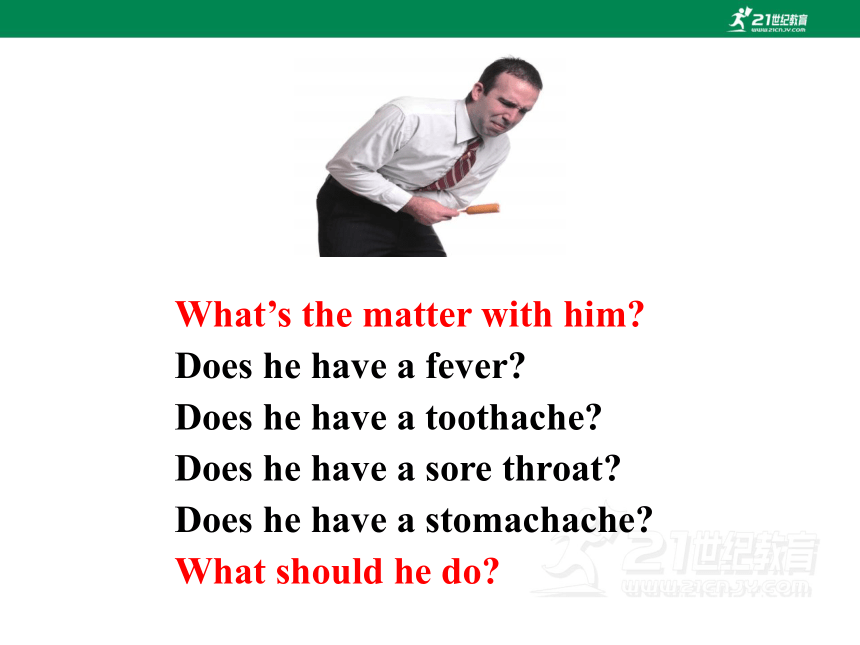
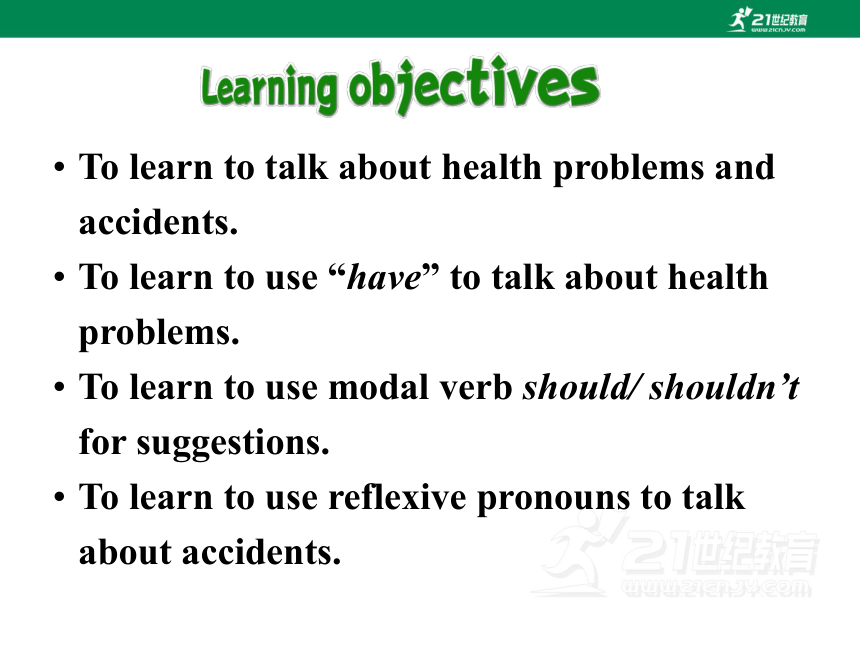

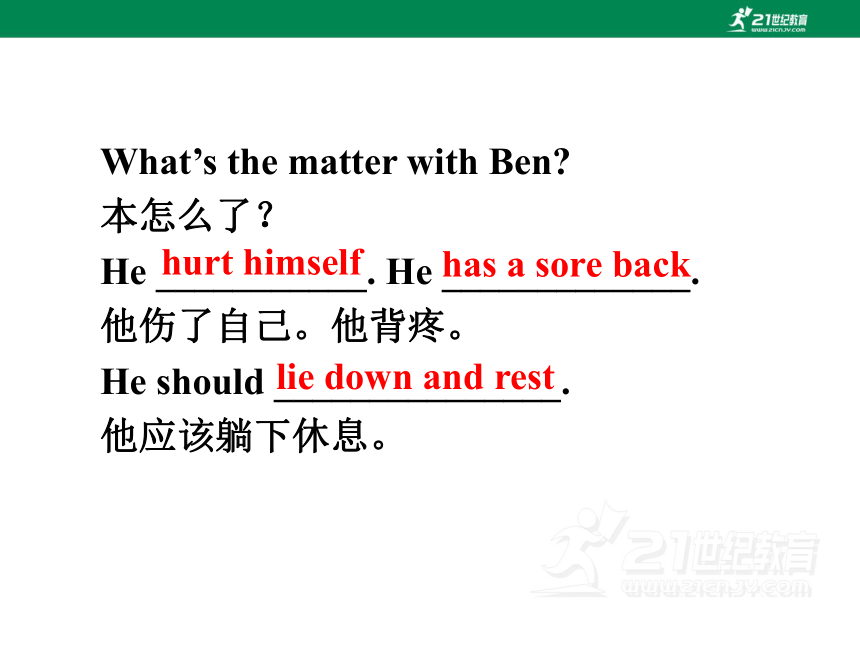
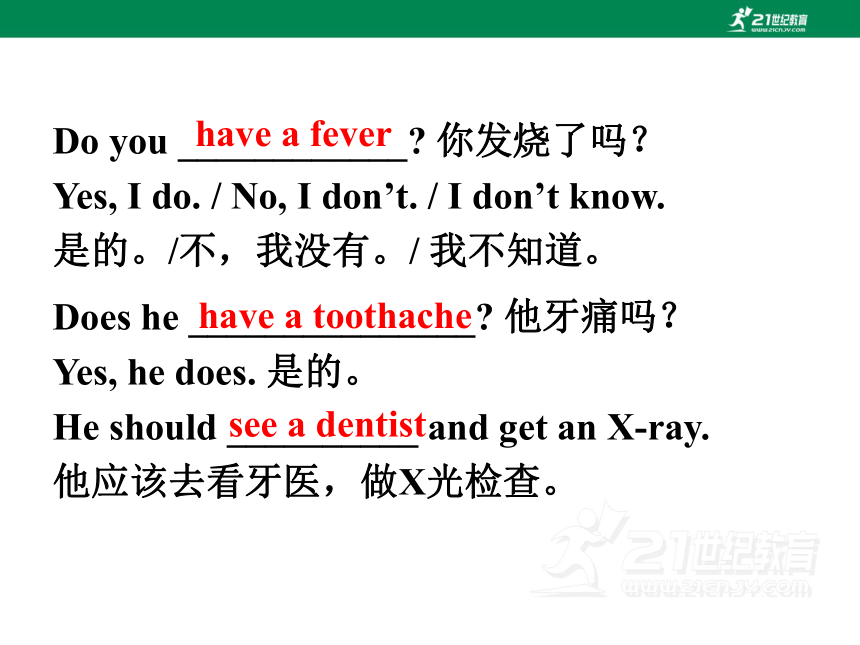
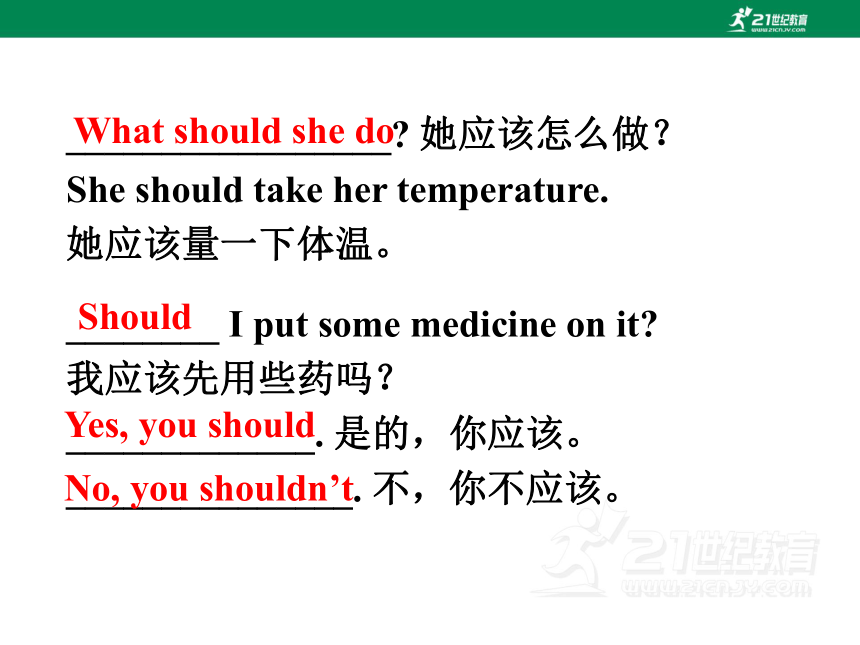
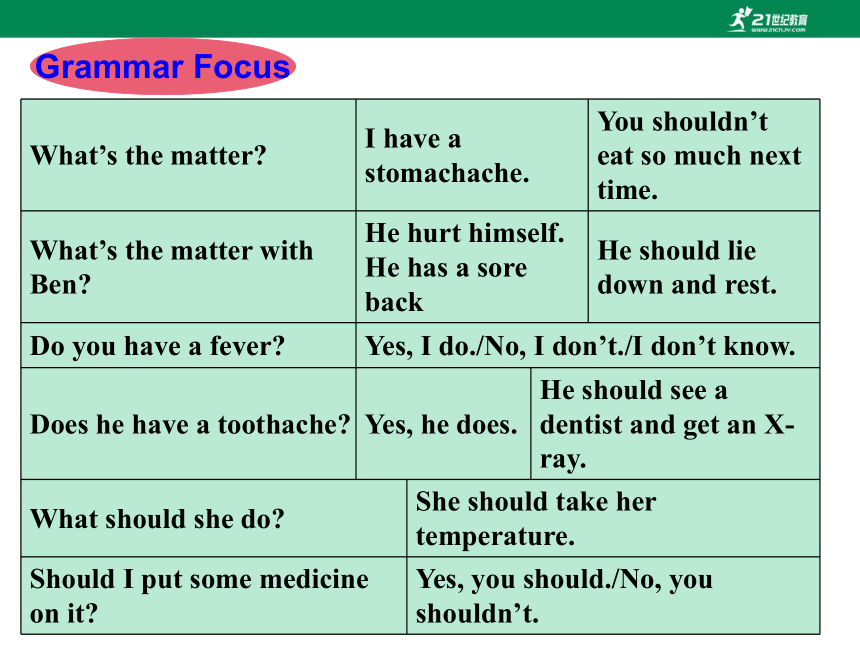
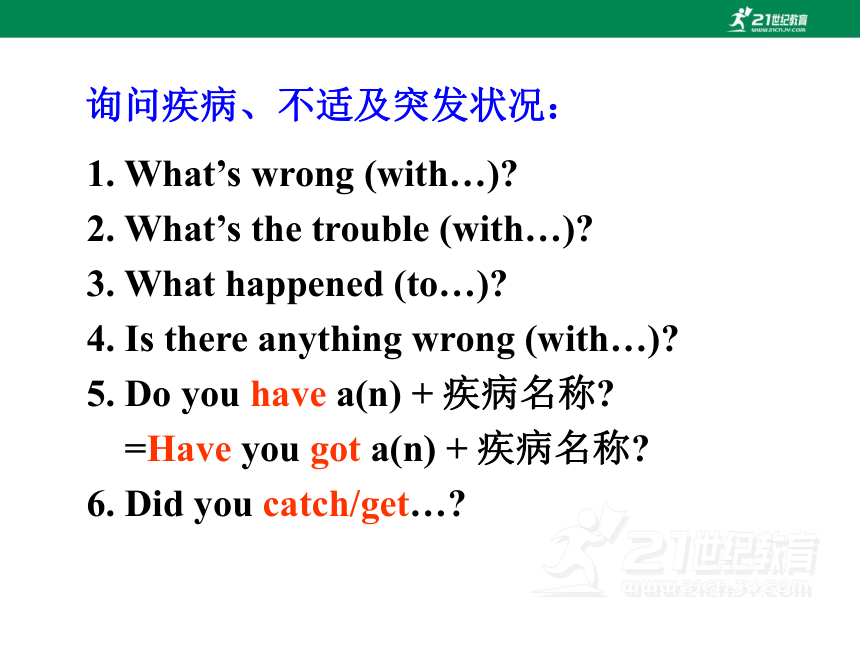
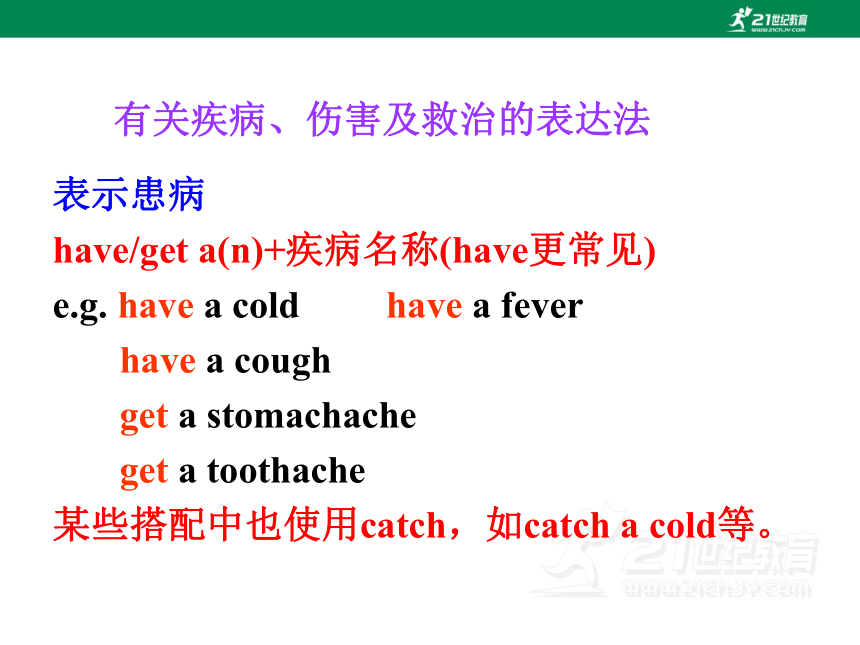
文档简介
(共43张PPT)
Unit 1
What's the matter
What’s the matter with him
Does he have a fever
Does he have a toothache
What should he do
What’s the matter with her
Does she have a fever
Does she have a toothache Does she have a backache
Does she have a sore throat
What should she do
What’s the matter with him
Does he have a fever
Does he have a toothache
Does he have a sore throat
Does he have a stomachache
What should he do
To learn to talk about health problems and accidents.
To learn to use “have” to talk about health problems.
To learn to use modal verb should/ shouldn’t for suggestions.
To learn to use reflexive pronouns to talk about accidents.
________________ 怎么了?
I have a ____________. 我胃疼。
You _________ eat so much next time.
你下次不该吃那么多。
根据所给汉语意思把句子补充完整。
What’s the matter
stomachache
shouldn’t
What’s the matter with Ben
本怎么了?
He ___________. He _____________.
他伤了自己。他背疼。
He should _______________.
他应该躺下休息。
has a sore back
lie down and rest
hurt himself
Do you ____________ 你发烧了吗?
Yes, I do. / No, I don’t. / I don’t know.
是的。/不,我没有。/ 我不知道。
Does he _______________ 他牙痛吗?
Yes, he does. 是的。
He should __________ and get an X-ray.
他应该去看牙医,做X光检查。
have a fever
have a toothache
see a dentist
_________________ 她应该怎么做?
She should take her temperature.
她应该量一下体温。
________ I put some medicine on it
我应该先用些药吗?
_____________. 是的,你应该。
_______________. 不,你不应该。
What should she do
Should
Yes, you should
No, you shouldn’t
Grammar Focus
What’s the matter I have a stomachache. You shouldn’t eat so much next time.
What’s the matter with Ben He hurt himself. He has a sore back He should lie down and rest.
Do you have a fever Yes, I do./No, I don’t./I don’t know. Does he have a toothache Yes, he does. He should see a dentist and get an X-ray. What should she do She should take her temperature. Should I put some medicine on it Yes, you should./No, you shouldn’t. 询问疾病、不适及突发状况:
1. What’s wrong (with…)
2. What’s the trouble (with…)
3. What happened (to…)
4. Is there anything wrong (with…)
5. Do you have a(n) + 疾病名称
=Have you got a(n) + 疾病名称
6. Did you catch/get…
有关疾病、伤害及救治的表达法
表示患病
have/get a(n)+疾病名称(have更常见)
e.g. have a cold have a fever
have a cough
get a stomachache
get a toothache
某些搭配中也使用catch,如catch a cold等。
表示不适
get+V-ed形式
be/feel+形容词
be/feel tired be/feel sick
be/feel dizzy(晕头转向)
head feels hot
get hurt get cut in the hand
get hit by a ball
表示伤害
hurt/cut+反身代词
hurt/cut/break+身体具体部位
hurt my leg cut her finger
break his arm
hurt myself
cut himself
表达诊治:take/get…(take更常见)
take one’s temperature take some medicine
take an injection (注射)
take/get an X-ray
表达就医:see…/go to…
see the dentist/doctor go to a doctor
go to (the) hospital
读以下四个句子,总结have的用法。
have / has
I have a bag.
He has noodles for breakfast.
I have a bad cold.
They have a look at the picture.
1. 作“有”讲。 如:
I have a bag. 我有一个包。
He has a red cup. 他有一个红杯子。
2. 作“吃、喝”讲。如:
have breakfast (吃早饭)
have tea (喝茶)
have a biscuit (吃块饼干)
have a drink (喝点水)
3. 作“患病”讲。
have a cold, have a fever
4. 固定短语
have a try, have a look, have a party
have
1. 她有许多好朋友。
She _____ lots of good friends.
2. 当我们感冒时,应该多喝水。
When we _____ bad colds, we should drink more water.
3. 他早餐常吃鸡蛋。
He _____ eggs for breakfast.
4. 他昨天去参加聚会了。
He __________ yesterday.
has
have
has
had a party
【语境应用】完成句子。
should属情态动词, 后接动词原形, 没有人称和数的变化。用于提出建议劝告别人。
否定形式为should not, 缩写为shouldn’t。
1. — Tom, I have a toothache.
汤姆, 我牙痛。
— You should see a dentist.
你应当去看牙医。
should
2. — I’m not feeling well these days. I
have bad cough.
这些天我身体不适, 老是咳嗽。
— You shouldn’t smoke so much, I
think.
我认为你不该抽这么多烟。
3. — Should I put some medicine on it
— Yes, you should. / No, you
shouldn’t.
4. — What should she do
— She should take her temperature.
含should的一般疑问句是将should提至主语前;其简略回答分别为“Yes, 主语(人称代词)+should.”和“No, 主语(人称代词)+shouldn’t.”。
1. — She has a stomachache.
— She _________ eat so much next time.
2. — Should she see a dentist and get an X-ray
— Yes, she _______. / No, she _________.
shouldn’t
should
shouldn’t
【语境应用】
反身代词在使用时应注意和它所指的相应的对象在人称、性别、数上保持一致。
第一人称 第二人称 第三人称
单数 myself yourself himself
herself
itself
复数 ourselves yourselves themselves
1. 可用作宾语,指的是宾语和主语表示同一个或同一些的人或事物。
e.g. Maria bought herself a scarf.
玛丽亚给自己买了一条围巾。
We must look after ourselves very well.
我们必须好好照顾自己。
【归纳】
2. 可用作表语,指的是表语和主语表示同一个或同一些人或事物。
e.g. She isn’t quite herself today.
她今天身体不太舒服。
3. 可用作主语或宾语的同位语,常用来加强语气。
e.g. She herself will fly to London tomorrow.
明天她自己将要坐飞机去伦敦。
I met the writer himself last week.
我上周见到了那位作家本人。
4. 某些固定短语当中。
照顾自己
look after oneself / take care of oneself
自学
teach oneself sth./ learn sth. by oneself
玩得高兴,过得愉快
enjoy oneself
请自用……(随便吃/喝些……)
help oneself to sth.
1. The baby is too young. Don’t leave her at home by _______. (2019 四川遂宁)
A. she B. her
C. hers D. herself
2. —Jack, you swam very well. Who taught you
—Nobody. I taught ______. (2019湖北黄冈)
A. I B. me C. myself D. mine
D
C
3. Our teachers and parents will be proud of us because we have grown up and can be responsible for _______.
(2019湖南郴州)
A. themselves
B. ourselves
C. yourselves
B
5. Children should learn how to protect ______ in the face of danger.
(2018辽宁葫芦岛)
A. himself B. yourself
C. ourselves D. themselves
D
4. Welcome you all to Guangyuan and enjoy _______ here. (2019四川广元)
A. you B. your C. yourselves
C
Fill in the blanks and practice the conversations.
1. A: I hurt ______ when I played basketball yesterday. What _______ I do
B: You ______ see a doctor and get an X-ray.
myself
should
should
4a
2. A: _______ the matter
B: My sister and I ______ sore throats.
_______ we go to school
A: No, you _________.
What’s
have
Should
shouldn’t
3. A: _____ Mike _____ a fever
B: No, he _______. He _____ a stomachache.
A: He ______ drink some hot tea.
Does
have
doesn’t
has
should
1. Jenny cut herself.
She should (get an X-ray /
put some medicine on the cut).
My advice: __________________.
Circle the best advice for these health problems. Then add your own advice.
Put a bandage on it
4b
2. Kate has a toothache.
She should (see a dentist /get some sleep).
My advice: ________________________.
3. Mary and Sue have colds.
They shouldn’t (sleep/ exercise).
My advice: __________________.
She shouldn’t eat cold food
Drink more water
4. Bob has a sore back.
He should
(lie down and rest /
take his temperature).
My advice: ______________.
Get an X-ray
One student mimes a problem. The other students in your group guess the problem and give advice.
Name Problem Advice
Liu Peng fall down go home and rest
4c
A: What’s the matter Did you hurt yourself playing soccer.
B: No, I didn’t.
C: Did you fall down
B: Yes, I did.
D: You should go home and get some rest.
have for talking about health problems.
have + (a) + 病症
A: What’s the matter with Ben
B: He hurt himself. He has a sore back.
A: Do you have a fever
B: Yes, I do. (No, I don’t.)
Should/ shouldn’t for suggestions.
You shouldn’t eat so much next time.
Should I put some medicine on it
Reflexive pronouns for talking about accidents.
He didn’t think about himself.
Ⅰ. 根据括号内的要求完成下列各题。
1. I have the flu. (改为一般疑问句)
________ ________ ________ the flu
2. He should see the dentist first. (改为一般疑问句)
________ he ________ the dentist first
3. —Does Lily’s brother have a toothache (作肯定回答)
—________, ________ ________.
Do you have
Should see
Yes he does
4. —Should I take this kind of medicine (作否定回答)
—_______, _______ ________.
5. My father should exercise more. (对划线部分提问)
_______ _______ your father _______
6. Jenny can’t move her neck. (对划线部分提问)
_______ _______ _______ _______ Jenny
No you shouldn’t
What should do
What’s the matter with /
What is wrong with
Ⅱ. 根据括号内提示填空。
All of us want to keep healthy but few of us know how to keep healthy. Here is my advice.
First, (1)_______________________ (我们应该吃健康的食物) every day. Try not to eat junk food. As for teeth, (2)____________________________ (我们不应该吃太多的糖). If we eat too much, we’ll have a toothache.
Second, (3)__________________________ (我们应该进行足够的锻炼). My parents are good examples for me. They play sports every day in the park.
we should eat healthy food
we shouldn’t eat too much sugar
we should get enough exercise
They can breathe fresh air there. They are healthy. Sometimes they climb mountains and they enjoy (4)__________ (them).
Third, (5)_______________________ (我们必须有良好的睡眠). We should sleep at least eight hours every night. (6)______________________ (我们不应该熬夜). We should go to bed early and get up early. We should learn to look after (7)________ (our) well.
All in all, to keep healthy, I think it’s important to have a good living habit.
themselves
we must have a good sleep
We shouldn’t stay up late
ourselves
写出英语中有关疾病、伤害及救治的表达。
Preview the new words and expressions.
Preview 1a-1d on page 5.
Unit 1
What's the matter
What’s the matter with him
Does he have a fever
Does he have a toothache
What should he do
What’s the matter with her
Does she have a fever
Does she have a toothache Does she have a backache
Does she have a sore throat
What should she do
What’s the matter with him
Does he have a fever
Does he have a toothache
Does he have a sore throat
Does he have a stomachache
What should he do
To learn to talk about health problems and accidents.
To learn to use “have” to talk about health problems.
To learn to use modal verb should/ shouldn’t for suggestions.
To learn to use reflexive pronouns to talk about accidents.
________________ 怎么了?
I have a ____________. 我胃疼。
You _________ eat so much next time.
你下次不该吃那么多。
根据所给汉语意思把句子补充完整。
What’s the matter
stomachache
shouldn’t
What’s the matter with Ben
本怎么了?
He ___________. He _____________.
他伤了自己。他背疼。
He should _______________.
他应该躺下休息。
has a sore back
lie down and rest
hurt himself
Do you ____________ 你发烧了吗?
Yes, I do. / No, I don’t. / I don’t know.
是的。/不,我没有。/ 我不知道。
Does he _______________ 他牙痛吗?
Yes, he does. 是的。
He should __________ and get an X-ray.
他应该去看牙医,做X光检查。
have a fever
have a toothache
see a dentist
_________________ 她应该怎么做?
She should take her temperature.
她应该量一下体温。
________ I put some medicine on it
我应该先用些药吗?
_____________. 是的,你应该。
_______________. 不,你不应该。
What should she do
Should
Yes, you should
No, you shouldn’t
Grammar Focus
What’s the matter I have a stomachache. You shouldn’t eat so much next time.
What’s the matter with Ben He hurt himself. He has a sore back He should lie down and rest.
Do you have a fever Yes, I do./No, I don’t./I don’t know. Does he have a toothache Yes, he does. He should see a dentist and get an X-ray. What should she do She should take her temperature. Should I put some medicine on it Yes, you should./No, you shouldn’t. 询问疾病、不适及突发状况:
1. What’s wrong (with…)
2. What’s the trouble (with…)
3. What happened (to…)
4. Is there anything wrong (with…)
5. Do you have a(n) + 疾病名称
=Have you got a(n) + 疾病名称
6. Did you catch/get…
有关疾病、伤害及救治的表达法
表示患病
have/get a(n)+疾病名称(have更常见)
e.g. have a cold have a fever
have a cough
get a stomachache
get a toothache
某些搭配中也使用catch,如catch a cold等。
表示不适
get+V-ed形式
be/feel+形容词
be/feel tired be/feel sick
be/feel dizzy(晕头转向)
head feels hot
get hurt get cut in the hand
get hit by a ball
表示伤害
hurt/cut+反身代词
hurt/cut/break+身体具体部位
hurt my leg cut her finger
break his arm
hurt myself
cut himself
表达诊治:take/get…(take更常见)
take one’s temperature take some medicine
take an injection (注射)
take/get an X-ray
表达就医:see…/go to…
see the dentist/doctor go to a doctor
go to (the) hospital
读以下四个句子,总结have的用法。
have / has
I have a bag.
He has noodles for breakfast.
I have a bad cold.
They have a look at the picture.
1. 作“有”讲。 如:
I have a bag. 我有一个包。
He has a red cup. 他有一个红杯子。
2. 作“吃、喝”讲。如:
have breakfast (吃早饭)
have tea (喝茶)
have a biscuit (吃块饼干)
have a drink (喝点水)
3. 作“患病”讲。
have a cold, have a fever
4. 固定短语
have a try, have a look, have a party
have
1. 她有许多好朋友。
She _____ lots of good friends.
2. 当我们感冒时,应该多喝水。
When we _____ bad colds, we should drink more water.
3. 他早餐常吃鸡蛋。
He _____ eggs for breakfast.
4. 他昨天去参加聚会了。
He __________ yesterday.
has
have
has
had a party
【语境应用】完成句子。
should属情态动词, 后接动词原形, 没有人称和数的变化。用于提出建议劝告别人。
否定形式为should not, 缩写为shouldn’t。
1. — Tom, I have a toothache.
汤姆, 我牙痛。
— You should see a dentist.
你应当去看牙医。
should
2. — I’m not feeling well these days. I
have bad cough.
这些天我身体不适, 老是咳嗽。
— You shouldn’t smoke so much, I
think.
我认为你不该抽这么多烟。
3. — Should I put some medicine on it
— Yes, you should. / No, you
shouldn’t.
4. — What should she do
— She should take her temperature.
含should的一般疑问句是将should提至主语前;其简略回答分别为“Yes, 主语(人称代词)+should.”和“No, 主语(人称代词)+shouldn’t.”。
1. — She has a stomachache.
— She _________ eat so much next time.
2. — Should she see a dentist and get an X-ray
— Yes, she _______. / No, she _________.
shouldn’t
should
shouldn’t
【语境应用】
反身代词在使用时应注意和它所指的相应的对象在人称、性别、数上保持一致。
第一人称 第二人称 第三人称
单数 myself yourself himself
herself
itself
复数 ourselves yourselves themselves
1. 可用作宾语,指的是宾语和主语表示同一个或同一些的人或事物。
e.g. Maria bought herself a scarf.
玛丽亚给自己买了一条围巾。
We must look after ourselves very well.
我们必须好好照顾自己。
【归纳】
2. 可用作表语,指的是表语和主语表示同一个或同一些人或事物。
e.g. She isn’t quite herself today.
她今天身体不太舒服。
3. 可用作主语或宾语的同位语,常用来加强语气。
e.g. She herself will fly to London tomorrow.
明天她自己将要坐飞机去伦敦。
I met the writer himself last week.
我上周见到了那位作家本人。
4. 某些固定短语当中。
照顾自己
look after oneself / take care of oneself
自学
teach oneself sth./ learn sth. by oneself
玩得高兴,过得愉快
enjoy oneself
请自用……(随便吃/喝些……)
help oneself to sth.
1. The baby is too young. Don’t leave her at home by _______. (2019 四川遂宁)
A. she B. her
C. hers D. herself
2. —Jack, you swam very well. Who taught you
—Nobody. I taught ______. (2019湖北黄冈)
A. I B. me C. myself D. mine
D
C
3. Our teachers and parents will be proud of us because we have grown up and can be responsible for _______.
(2019湖南郴州)
A. themselves
B. ourselves
C. yourselves
B
5. Children should learn how to protect ______ in the face of danger.
(2018辽宁葫芦岛)
A. himself B. yourself
C. ourselves D. themselves
D
4. Welcome you all to Guangyuan and enjoy _______ here. (2019四川广元)
A. you B. your C. yourselves
C
Fill in the blanks and practice the conversations.
1. A: I hurt ______ when I played basketball yesterday. What _______ I do
B: You ______ see a doctor and get an X-ray.
myself
should
should
4a
2. A: _______ the matter
B: My sister and I ______ sore throats.
_______ we go to school
A: No, you _________.
What’s
have
Should
shouldn’t
3. A: _____ Mike _____ a fever
B: No, he _______. He _____ a stomachache.
A: He ______ drink some hot tea.
Does
have
doesn’t
has
should
1. Jenny cut herself.
She should (get an X-ray /
put some medicine on the cut).
My advice: __________________.
Circle the best advice for these health problems. Then add your own advice.
Put a bandage on it
4b
2. Kate has a toothache.
She should (see a dentist /get some sleep).
My advice: ________________________.
3. Mary and Sue have colds.
They shouldn’t (sleep/ exercise).
My advice: __________________.
She shouldn’t eat cold food
Drink more water
4. Bob has a sore back.
He should
(lie down and rest /
take his temperature).
My advice: ______________.
Get an X-ray
One student mimes a problem. The other students in your group guess the problem and give advice.
Name Problem Advice
Liu Peng fall down go home and rest
4c
A: What’s the matter Did you hurt yourself playing soccer.
B: No, I didn’t.
C: Did you fall down
B: Yes, I did.
D: You should go home and get some rest.
have for talking about health problems.
have + (a) + 病症
A: What’s the matter with Ben
B: He hurt himself. He has a sore back.
A: Do you have a fever
B: Yes, I do. (No, I don’t.)
Should/ shouldn’t for suggestions.
You shouldn’t eat so much next time.
Should I put some medicine on it
Reflexive pronouns for talking about accidents.
He didn’t think about himself.
Ⅰ. 根据括号内的要求完成下列各题。
1. I have the flu. (改为一般疑问句)
________ ________ ________ the flu
2. He should see the dentist first. (改为一般疑问句)
________ he ________ the dentist first
3. —Does Lily’s brother have a toothache (作肯定回答)
—________, ________ ________.
Do you have
Should see
Yes he does
4. —Should I take this kind of medicine (作否定回答)
—_______, _______ ________.
5. My father should exercise more. (对划线部分提问)
_______ _______ your father _______
6. Jenny can’t move her neck. (对划线部分提问)
_______ _______ _______ _______ Jenny
No you shouldn’t
What should do
What’s the matter with /
What is wrong with
Ⅱ. 根据括号内提示填空。
All of us want to keep healthy but few of us know how to keep healthy. Here is my advice.
First, (1)_______________________ (我们应该吃健康的食物) every day. Try not to eat junk food. As for teeth, (2)____________________________ (我们不应该吃太多的糖). If we eat too much, we’ll have a toothache.
Second, (3)__________________________ (我们应该进行足够的锻炼). My parents are good examples for me. They play sports every day in the park.
we should eat healthy food
we shouldn’t eat too much sugar
we should get enough exercise
They can breathe fresh air there. They are healthy. Sometimes they climb mountains and they enjoy (4)__________ (them).
Third, (5)_______________________ (我们必须有良好的睡眠). We should sleep at least eight hours every night. (6)______________________ (我们不应该熬夜). We should go to bed early and get up early. We should learn to look after (7)________ (our) well.
All in all, to keep healthy, I think it’s important to have a good living habit.
themselves
we must have a good sleep
We shouldn’t stay up late
ourselves
写出英语中有关疾病、伤害及救治的表达。
Preview the new words and expressions.
Preview 1a-1d on page 5.
同课章节目录
- Unit 1 What's the matter?
- Section A
- Section B
- Unit 2 I'll help to clean up the city parks.
- Section A
- Section B
- Unit 3 Could you please clean your room?
- Section A
- Section B
- Unit 4 Why don't you talk to your parents?
- Section A
- Section B
- Unit 5 What were you doing when the rainstorm came
- Section A
- Section B
- Review of Units 1-5
- Unit 6 An old man tried to move the mountains.
- Section A
- Section B
- Unit 7 What's the highest mountain in the world?
- Section A
- Section B
- Unit 8 Have you read Treasure Island yet?
- Section A
- Section B
- Unit 9 Have you ever been to a museum?
- Section A
- Section B
- Unit 10 I've had this bike for three years.
- Section A
- Section B
